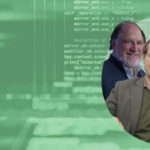BBVA Foundation's Frontiers of Knowledge award goes to four mathematicians who help enable a secure digital society
The BBVA Foundation´s Frontiers of Knowledge Award was won by four mathematicians - Shafi Goldwasser, Silvio Micali, Ronald Rivest and Adi Shamir - for their outstanding contributions to cryptology, a science that has proven crucial to ensuring security in the online world.

The digital society we know today would not exist without modern cryptology. The algorithms and security protocols developed by mathematicians like Goldwasser, Micali, Rivest and Shamir, make possible the secure transmission of information - from e-mails to online purchases to financial transactions and electronic voting.
What´s more, the winners of the Frontiers of Knowledge Award have laid the foundations for developments such as blockchain, cryptocurrencies and the digital signature. In announcing its decision, the jury said that the four researchers were awarded the prize for their “fundamental contributions to modern cryptology, an area of a tremendous impact on our everyday life,”
In 1978, Adi Shamir and Ronald Rivest, along with Leonard Adleman, created the RSA algorithm (named for their surnames’ initials) which was “the first of the secure protocols that defined the face of modern cryptography,” the jury said. The use of RSA, in combination with other technologies, continues to be widespread today.
Shamir and Rivest, who today work, respectively at the Weizmann Institute in Israel and the Massachsetts Institute of Techonlogy, reached this first achievement when they were working together at MIT. For the past forty years they have continued to contribute actively to different areas of cryptography.
At that time, Shafi Goldwasser was a student at Carnegie Mellon University and Micali at the Sapienza University of Rome. A few years later, in 1982, the two coincided in a doctoral program at the University of California, Berkeley (USA). They embarked on a fruitful collaboration whose first major result would be the mathematical demonstration of when an encryption method is genuinely unbreakable.
To prove a thing is secure, you need to go further"
As Micali explained upon learning of the jury´s decision, “for thousands of years people have been trying to encrypt messages, but these were only secure until the moment they stopped being so, because someone had unlocked the code. RSA proposed an encryption scheme that no one could to break, but at the same time no one could prove was unbreakable. To prove a thing is secure, you need to go further. You want to be sure that no future attack can succeed. Our contribution was to apply a rigorous method to ensure that if someone wants to understand part of an encrypted message, they would first have to solve a mathematical problem that has stood unsolved for hundreds of years.”
Following on from these seminal achievements, Goldwasser and Micali, together and separately, “have expanded the scope of cryptography beyond its traditional goal of secure communication,” the jury said, with developments that have helped build today’s flourishing digital society by allowing users to collaborate, share information and shop online without sacrificing security.
For instance, both scientists contributed (with Charles Rackoff) to the development of the “zero-knowledge proof,” which shows that it is possible to convince your interlocutor of the truth of something without revealing what that something is. The result is an algorithm that underlies a wide range of applications from authentication processes to Bitcoin transactions.
In our daily lives, any ‘password’ we type or digital signature we use is protected by techniques based on our work”
Goldwasser singled out another contribution, which is vital to properly harness the power of big data: when a series of organizations pool their databases to extract the greatest possible amount of information from the resulting aggregate, but without disclosing the identity embedded in the data. This is what happens when, for example, the genomic data of a population are shared.
Goldwasser believes it is vital that citizens learn to value their personal data, and stop giving them away for free. She insists that, with today’s cryptographic tools, privacy and security are readily compatible. She is also convinced of the area’s huge untapped potential: “We have effective cryptographic methods that are still not being used… IT firms should do more to build systems to make use of the beautiful ideas we have come up with in the cryptographic field that have never been implemented.”
The bitcoin and blockchain technologies are another topic currently occupying these four experts. For Rivest, "Bitcoin is an interesting technology, but the truth is, there is a lot of hype associated with the phenomenon and it is too early to say whether it will become a reliable system capable of ushering in the new digital economy."